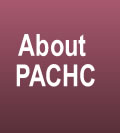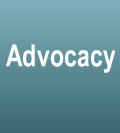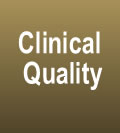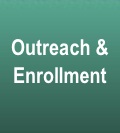| Fact Sheets | FAQs |
Health Center Frequently Asked Questions
CMS Health Insurance Marketplace FAQs
HRSA OUTREACH & ENROLLMENT T/A
IN-PERSON ENROLLMENT ASSISTERS
If able can you provide a brief summary of the differences between a CAC and a Navigator? I am at a meeting and there is much confusion about the differences.
Primary difference is the funding source. CACs in Community Health Centers are funded through HRSA grants and Navigators are funded through HHS grants (federal funds). All of the Health Centers received HRSA funding to hire CAC’s. PACHC received HHS funding to serve in a “Lead Navigator” role and distributed funding to 1 FQHC Look-Alikes and 3 Rural Health Clinic, because these entities were not eligible for HRSA funding. Responsibilities for CACs and Navigators are nearly identical.
At what point are Certified Application Counselor’s Certified. What steps need to take place after the training is completed through CCIIO?
The CAC’s organization will generate an official certificate (from template included and provided in the organizations welcome kit) then provide officiate certificate to CAC.
INREACH & OUTREACH
As a Navigator grantee, can we collect consumer personally identifiable information (PII), such as phone numbers and email addresses, in order to follow-up with consumers on applying for or enrolling into coverage?
Yes. CMS has revised its model consent form template to include the collection of limited contact information such as an email address or phone number to follow-up with consumers on the application and enrollment process. This follow-up contact information is optional and a consumer is not required to provide it. Remember, the CMS-developed consent form is a model template, and grantees are free to develop their own, or amend as they choose.
Can I continue to collect and use personal information of the clients my organization works with if that information is associated with separate areas of work from the work we do as a Navigator grantee?
Yes, your organization’s collection and management of personal consumer information not associated with the Navigator grant program is not affected by the privacy and security requirements detailed in the Navigator grant terms and conditions.
ELIGIBILITY for MARKETPLACE COVERAGE
Can people who aren’t U.S. citizens apply for health coverage through the Marketplace?
Lawfully present immigrants can apply for health coverage. Immigration information entered into the Marketplace will be used for administration of the Marketplace and insurance affordability programs only. People who aren’t applying for health coverage don’t need to provide their citizenship or immigration status. Use of coverage obtained through the Marketplace or insurance affordability programs won’t affect a person who’s in the process of becoming a lawful permanent resident (green card holder) and won’t be considered a public charge. A public charge is an individual who is likely to become primarily dependent on the government for subsistence, as demonstrated by either the receipt of public cash assistance for income maintenance or institutionalization for long-term care at government expense.
Do you have any additional information on the Marketplace for Americans who may travel or move back and forth to Puerto Rico?
This is definitely a plan-specific question. The individual would need to review the terms of the plan they’re choosing (and possibly contact the insurance company) to determine if it covers services outside of the state (specifically in Puerto Rico). If the consumer is traveling there for a short period of time, then there is usually something to that effect built in, and that may be stated in the Plan Brochure, but this is not always the case, so it is definitely worth looking into first. If the consumer is moving to Puerto Rico to become a resident there, then that’s definitely a different situation and they would likely need to purchase coverage there.
ENROLLMENT/APPLICATION ASSISTANCE
I came across the CAC authorization form, and I am wondering if CACs must have this form signed and completed for each client they assist. Please let me know if this is necessary so that I can accordingly advise our team of CACs.
The Authorization form is only required when there is a need to store consumer contact information. It’s only required for consumers who have given you permission to follow-up with them, which means you will be storing their contact information (phone#, email, address, etc.)
As you know many organizations are moving towards doing paper applications. LCH started doing paper applications this week and we have been running into a lot of confusion with whether or not our clients need to include Appendix A (the employer coverage tool). The application states: “Is anyone listed on this application offered health coverage from a job? Check yes even if the coverage is from someone else’s job, such as a parent or spouse.” Do we need to check yes, even if the person who is offered coverage is not applying to obtain health coverage? If you check Yes then then you have to complete Appendix A. Also, do you know if dependents on income taxes will be counted as house old size even if there are out of the country?
No, if the individual is not applying for health coverage, than the individual should not be listed. Only those individuals applying for health coverage should be listed not sure I understand the question…If a dependent (child, spouse, etc.) relies on you for support, then they should be listed on income taxes, however, individuals living outside of Pennsylvania are not able to enroll in the Pennsylvania’s Health Insurance Marketplace. Let me know if I did not address your concern.
If an enrollment is incomplete, and the consumer has to obtain additional data or documents, does the Navigator contact the consumer if they don’t hear from them?
No, Navigator should not retain any consumer information, so in following that requirement, they won't have any information to use to contact the consumer. However, the Navigator can maintain consumer contact information if consumer has given consent to do in writing.
Do I have to provide Social Security numbers (SSNs) for people listed on my application?
People who apply for health coverage need to provide an SSN if they have one. An application filer must also provide the SSN of any tax filer who isn’t applying for health coverage if the tax filer’s tax information will be used to verify the household’s eligibility for help with paying for health coverage. Other people not applying for health coverage are encouraged to provide their SSNs to speed up the application process, but aren’t required to provide one. We use SSNs to check income and other information to see who’s eligible for help with health coverage costs. If someone wants help getting an SSN, they can visit socialsecurity.gov, or call 1-800-772-1213. TTY users should call 1-800-325-0778.
Can Navigators and certified application counselors assist consumers by directly filling out the application when working face-to-face with that consumer?
Yes, if you are working face-to-face with a consumer and they request your help in filling out their application (for example, if the consumer has a disability), you are free to do so. However, if you speak to a consumer by phone, you cannot fill out an application on their behalf, as it would require the consumer to share with you their Marketplace user name and password over the phone. To assist a consumer by phone, you may answer general questions, or walk through the application with the consumer as they enter their own information, but you may not enter their personal information without the consumer physically present.
Can CACs and Navigators help consumers set up an email account if they do not already have one!
In order to begin an application on HealthCare.gov, consumers need to create a “My Account” first. To create this account, consumers need to provide an email address, and need to verify their account by checking their email and clicking on a verification link that they will receive from healthcare.gov. Applicants who do not yet have email addresses can still apply online, but they will need to set up a free email account by choosing one of the links at the bottom of the account creation page. You can help them set up an email account, and verify their healthcare.gov “My Account” using the verification link, before continuing to the application. For this purpose, it is important that computers which are going to be used for the application process do not block access to popular sites. If you do help an applicant set up an email account, please make sure the applicant knows his/her email address and password. You should not keep the applicant’s password. If the individual is unwilling or uncomfortable with establishing an email address, the FFM’s call center will assist him or her in applying for coverage without an electronic account/email address. Navigators cannot use their own email address or an organization’s email address in place of an individual consumer’s.
What are your suggestion regarding helping consumers choose a plan?
As you know, we can’t make recommendations as to one health plan over another. We are only able to provide facts, (i.e., cost, coverage, provider network).
I know that we cannot suggest one insurance over the other however with the Highmark and UPMC issue my first question to consumers has been which health system is your current physician in.
This is a good approach, its ok to do and one I would certainly recommend. Yes, it’s the right approach.
The tax credits and cost-sharing subsidies apply ONLY to the Silver plans, correct?
To take advantage of the tax credits and cost-sharing reductions, consumers must choose the Silver plan (certain members of federally-recognized tribes may take advantage of cost sharing reductions at any health plan category).
Can you please tell me how I can find out detailed plan information for plans in the marketplace? Office visit copayments etc., I would like to print out myself a list to have on hand in case I have a problem with the website.
Click to preview marketplace health plan prices before the tax credit is applied. This may be useful, although it does require a little more work, but you will be able to give consumers an idea of costs. HHS allows consumers to preview health plans and prices available in their area without having to create an account. To find out their actual costs, consumers will still need to apply. The estimates provided on this site do NOT include the premium subsidies. Individuals between 100% and 400% of federal poverty level (FPL) are eligible for subsidies in the exchange that make their insurance more affordable. https://www.healthcare.gov/health-and-dental-plan-datasets-for-researchers-and-issuers/
AFFORDABLE CARE ACT
What will be the impact of the Affordable Care Act provisions going into effect have on people who have a catastrophic illness or a long-term chronic condition?
Health insurance plans can’t refuse to cover or charge more just because of pre-existing health condition. Coverage for a pre-existing condition begins immediately. This is true even if person has been turned down or refused coverage due to a pre-existing condition in the past. Only one exception is for grandfathered individual health insurance plans – the kind you buy yourself, not through an employer. They do not have to cover pre-existing conditions. If a person has one of these plans they can switch to a Marketplace plan during open enrollment and immediately get coverage for their pre-existing conditions.
Under the Affordable Care Act, what is the fine if someone does not purchase insurance?
Failure to obtain coverage will be subject to penalties from the IRS. For 2014, the penalty was be the greater of $95 per year or 1% of taxable income. For 2015, the penalty on individuals that lack coverage increases to the greater of $325 or 2% of taxable income. For 2016, the penalty on individuals that lack coverage increases to the greater of $695 or 2.5% of taxable income. Exceptions for the individual mandate may be made for financial hardship
What would enable an individual to be exempt from that fine?
People who cannot afford coverage or whose income is below the federal filing threshold are exempt from the penalty.
- Affordable = Less than or equal to 8% of income
DATA COLLECTION
I didn’t realize that you would need the paper copies of the data collection sheets. I had been instructing our staff to use the paper data collection sheet as an optional tool if they were not able to enter the data immediately into the computer. Many of our Navigators have found it more streamlined to simply add the data directly to the website instead of writing it on the paper form first. For this reason, it might be difficult for us to provide you with paper documentation for quality assurance. Is there any other way that we could give you the information you need? Also, can you clarify how you would like us to capture the validation numbers from the site?
I will address the validation (reference) number first…at the completion of entering enrollee information into the database, a reference number will be issued, which is to be placed on the enrollee data collection form (upper right-hand side). The intent was to match up the data collection form with information entered into the database. The purpose of maintaining a copy of the data collection form is to provide support or validation of the information entered (if it was ever needed).
So with the new addition on the data forms if someone calls us or just sees us briefly while in the building and asks information about the act do we need to do a data sheet for them? I would not think so-but just making sure.
Only complete form (to the best of your ability) if consumer visits your health center.
Should we still keep a paper copy of the data collection form after we enter them into the system?
I would keep a paper copy for your files. Although it’s not mandatory, it can be used as backup should there be a need to verify information entered into the web-based data collection instrument.
SMALL BUSINESS HEALTH OPTIONS PROGRAM (SHOP)
How involved are Certified Application Counselor’s/Navigators, who are working in the Community Health Center, going to be in the SHOP piece of the Marketplace. What is the expectation, if there is one?
Enrollment Assisters (Navigators/CACs) will be determining eligibility for employees and employers in the Small Business Health Options Program (SHOP) Marketplace. Expectation is to assist consumers, employees and employers (consistently) whether it is in the Health Insurance Marketplace or the SHOP Marketplace.
©2016 Pennsylvania Association of Community Health Centers
1035 Mumma Road, Suite 1, Wormleysburg, PA 17043













